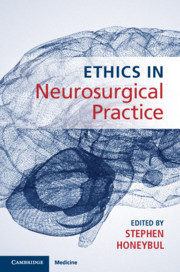Book contents
- Ethics in Neurosurgical Practice
- Ethics in Neurosurgical Practice
- Copyright page
- Contents
- Contributors
- Introduction
- Part I General Ethics
- Part II Neurosurgery-Specific Bioethics
- Chapter 10 A Historical Overview of Ethics in Neurosurgery
- Chapter 11 Evidence-Based Neurosurgery: Principles, Applicability, and Challenges
- Chapter 12 Ethical Challenges of Neurosurgical Care for Brain Tumour Patients
- Chapter 13 Severe Traumatic Brain Injury
- Chapter 14 ‘Malignant’ Middle Cerebral Artery Infarction
- Chapter 15 Aneurysmal Subarachnoid Haemorrhage
- Chapter 16 Paediatric Neurosurgery
- Chapter 17 Spinal Neurosurgery
- Chapter 18 Ethical Challenges in Psychosurgery: A New Start or More of the Same?
- Chapter 19 Brain Death and Organ Donation
- Part III Future Developments
- Index
- References
Chapter 17 - Spinal Neurosurgery
from Part II - Neurosurgery-Specific Bioethics
Published online by Cambridge University Press: 29 May 2020
- Ethics in Neurosurgical Practice
- Ethics in Neurosurgical Practice
- Copyright page
- Contents
- Contributors
- Introduction
- Part I General Ethics
- Part II Neurosurgery-Specific Bioethics
- Chapter 10 A Historical Overview of Ethics in Neurosurgery
- Chapter 11 Evidence-Based Neurosurgery: Principles, Applicability, and Challenges
- Chapter 12 Ethical Challenges of Neurosurgical Care for Brain Tumour Patients
- Chapter 13 Severe Traumatic Brain Injury
- Chapter 14 ‘Malignant’ Middle Cerebral Artery Infarction
- Chapter 15 Aneurysmal Subarachnoid Haemorrhage
- Chapter 16 Paediatric Neurosurgery
- Chapter 17 Spinal Neurosurgery
- Chapter 18 Ethical Challenges in Psychosurgery: A New Start or More of the Same?
- Chapter 19 Brain Death and Organ Donation
- Part III Future Developments
- Index
- References
Summary
Spinal surgery is unique to other neurosurgical subspecialties such as trauma, tumor, and vascular neurosurgery in that it is generally for preservation of quality of life rather than life-preserving surgery. This, along with the nature of degenerative disease as well as the unique relationship and influence of industry, has created unique ethical issues within the spine surgery field.
- Type
- Chapter
- Information
- Ethics in Neurosurgical Practice , pp. 168 - 174Publisher: Cambridge University PressPrint publication year: 2020

